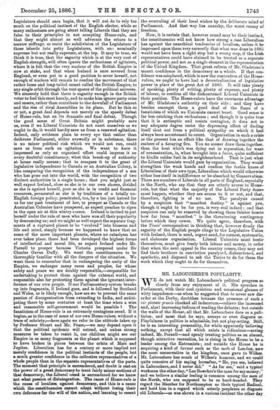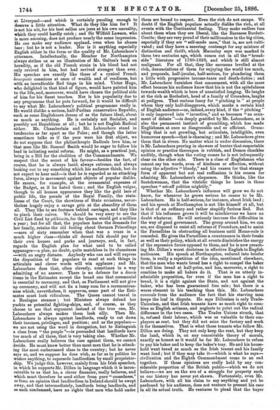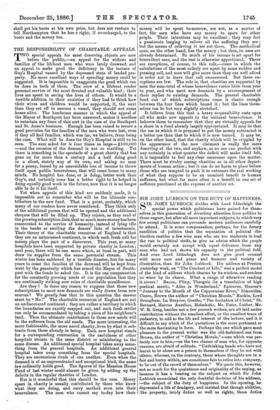MR. LABOUCHERE'S POPULARITY.
WE do not watch Mr. Labouchere's political progress so closely from any enjoyment of it. His speeches in Parliament, with their cool cynicism and occasional gleams of witty impudence—as when he suggested that he never saw dis- order at the Derby, doubtless because the presence of such a vir pietate gravis checked all indecorum—relieve the increased and, alas! increasing tedium of reading the debates; but outside the walls of the House, all that Mr. Labouchere does as a poli- tician, and most that he says, annoys or even disgusts ur. Playfulness in politics is admissible, but not play-acting. Still, he is an interesting personality, for while apparently believing nothing, except that all which exists is ridiculous—saving indeed, Mr. Parnell—and openly treating politics as an absurd, though attractive recreation, he is rising in the House to be a leader among the Extremists ; and outside the House he is acquiring a kind of favour such as the mob of London, new the most conservative in the kingdom, once gave to Wilkes. Mr. Labouchere has much of Wilkes's humour, and we could quite conceive of his saying hereafter, "He, you see, believed in Labouchere, and I never did." "As for me," said a typical workman the other day," Lee Bowcher's the man for my money;" and we believe a similar feeling is common among the men of the North, who are supposed to be so hard-headed. They regard the Member for Northampton as their typical Radical, and hold him in a regard which utterly perplexes or disgusts old Liberals—as was shown in a curious incident the other day at Liverpool—and which is certainly puzzling enough to deserve a little attention. What do they like him for ? It is not his wit, for his best sallies are jeers at his own unreality, which they could hardly catch ; and Sir Wilfrid Lawson, who is more amusing, does not produce nearly the same impression. He can make any audience applaud, even when he abuses beer ; but he is not a leader. Nor is it anything especially English either in the form or the quality of Mr. Labouchere's utterance. Intellectually, the Member for Northampton always strikes us as an illustration of Mr. Galton's book on heredity, as if the old French strain in his blood had not only revived in him, but had revived stronger than ever. His speeches are exactly like those of a cynical French bourgeois conscious at once of wealth and of readiness, but with an ineradicable Red tinge in his mind. Victor Hugo, who delighted in that kind of figure, would have painted him to the life, and, moreover, would have chosen the political side of him for his finest touches. Nor is his popularity due to any programme that he puts forward, for it would be difficult to say what Mr. Labouchere's political programme really is. He would dislike a serious, half-Puritan conservative Republic, such as some Englishmen dream of as the future ideal, about as much as anything. He is certainly not Socialist, and possibly not Republican at all ; but he is not English Radical either. Mr. Chamberlain and Mr. Labouchere stand in tendencies as far apart as the Poles ; and though the latter sometimes talks as if the poor were his first object, we do not suppose that the philanthropic Radicals love him, or that men like Mr. Samuel Smith would be eager to follow his lead in initiating social reform. He might, as a practical jest, bring in a Bill for the abolition of the Commandments. We suspect that the secret of his favour—besides the fact, of course, that he is always lucid, always extreme, and always looking out to say something which his audience think, but do not expect to hear said—is that he is regarded as an attacking force, always in movement against objects of popular dislike. He sneers, for example, at the ornamental expenses of the Budget, as if he hated them ; and the English vulgar, though to all human appearance they like the gold lace of public life, the parade of the Royal Family, the state- liness of the Court, the showiness of State occasions, never- theless hugely enjoy a savage grin at the absurdity of them all. They like to see footmen behind carriages, and they like to pinch their calves. We should be very sorry to see the Civil List fixed by plebiscite, for the Queen would get a million a year ; but for all that, the populace hates the demands for her family, retains the old feeling about German Princelings —men of sixty remember when that was a craze in a much higher class—thinks all decent folk should pay for their own houses and parks and journeys, and, in fact, regards the English plan for what used to be called appanages—a plan, no doubt, quite matchless in its clumsiness —with an angry distaste. Anybody who can and will express the disposition of the populace to snarl at such things in articulate and clever words will win applause ; and Mr. Labouchere does that, often cleverly, sometimes in a way admitting of no answer. There is no defence for a dozen items in the Estimates except the broad one that ceremonial is essential to ceremony, and that, as Parliament will not give up ceremony, and will not fix a lump sum for a ceremonious- ness which, nevertheless, it approves, some part of the Esti- mates must look ridiculous. The Queen cannot travel in a Boulogne steamer ; but Ministers always defend her yachts as potential fighting-ships, and, of course, as they choose to use that argument instead of the true one, Mr. Labouchere always makes them look silly. Then Mr. Labouchere is always against landlords, ready to cut down their incomes, privileges, and position; and as the populace— we are not using the word in derogation, but to distinguish a class from "the people "—is persuaded that landlords have too much of all three, that is very taking also. Whether Mr. Labouchere really believes the case against them, we cannot decide. He must know better than most men that he is attack- ing the most embarrassed class in the country; but he never says so, and we suppose he does wish, as far as in politics he wishes anything, to supersede landlordism by small proprietor- ship. We judge this, however, mainly from his Irish speeches, in which he supports Mr. Dillon in language which it is incon- ceivable to us that he, a clever financier, really believes, and which must therefore be used either from pure "cussedness," or from an opinion that landlordism in Ireland should be swept away, and that intermediately, landlords being landlords, and as such condemned, have no rights that men who hold under
them are bound to respect. Even the rich do not escape. We doubt if the English populace actually dislike the rich, at all events with the Continental feeling. They make endless fuss about them when they are liberal, like the Baroness Burdett- Coutts ; they are very proud of their millionaires in the big cities, especially if they are "self-made men," that is, are not culti- vated; and they have a sneering contempt for any mixture of distinction and thrift, which Macaulay says was marked in them two centuries ago, which comes out in all the " broad- side " literature of 1780-1820, and which is still almost malignant. For all that, they like sarcasms levelled at the rich, denunciations of them for enjoying the world too much, and proposals, half-jocular, half-serious, for plundering them a little with progressive income-taxes and death-duties ; and Mr. Labouchere furnishes that amusement, with all the more effect because his audience know that his is not the spitefulness towards wealth which is born of unsatisfied longing. He laughs at the rich as Rochefort, head of a family of Crusaders, laughs at pedigree. That curious fancy for "pitching in" at people whom they only half-disapprove, which marks a certain kind of English audience—or, indeed, every kind, if the " pitching " is only improved into "invective," and so becomes "an orna- ment of debate "—is deeply gratified by Mr. Labouchere, as is also the permanent instinct of grumbling, which has made Englishmen at once so disagreeable and so efficient. Grum- bling that is not growling, but articulate, intelligible, even humorous speech—that is charming ; and Mr. Labouchere gives them that in rivers. No matter what is under discussion, there is Mr. Labouchere proving in showers of banter that respectable opinion or practice thereupon is rubbish, and Demos chuckles audibly, though when the voting comes he is not infrequently clear on the other side. There is a class of Englishman who cannot say ten words, even of kindness or affection, without using the adjective "bloody," and his reason for that strange form of apparent but not real ruffianism is his reason for admiring Mr. Labouchere's eloquence. He thinks, like the Scotchwoman, that the vitriolic things he hears in those speeches " set-aff politics mightily."
Whether Mr. Labouchere's influence will grow we do not know, for whenever he grows serious he ceases to be Mr. Labouchere. He is half-serious, for instance, about Irish land ; and his speech at Northampton is not like himself at all, but is that of an ordinary and rather stupidly furious Red. But that if his influence grows it will be mischievous we have no doubt whatever. He will seriously incre,ase the difficulties in the way of good government. The group around him, we can see, are disposed to resist all reforms of Procedure, and to assist the Parnellites in obstructing all business until Home-rule is conceded. He gives the Parnellites a countenance in their freaks as well as their policy, which at all events diminishes the energy of the repressive forces opposed to them, and he is now preach- ing Mr. Dillon's worst doctrines in effective English to English audiences. His speech at Northampton, reduced into briefer form, is really a repetition of the idea, mentioned elsewhere, that the man who wants bread has a right to compel the baker to sell him bread at half-price, and has, moreover, a right to combine to make all bakers do it. That is an utterly in- admisible proposition, for even if the man has a right to bread, it is a right against the State, and not against the baker, who has been guaranteed free sale ; but there is a worse element in his teaching than this. Mr. Labouchere conceals from the audience the fact that his starving man keeps the loaf in dispute. He says Dillonism is only Trade- Unionism, and that Irish tenants have as much right to com- bine as English artisans, and neglects to point out the radical difference in the two cases. The Trades Unions struck, that is, refused their labour, which was as valuable to their em- ployers as rent, but they did not seize the factory and work it for themselves. That is what those tenants who follow Mr. Dillon are doing. They not only keep the rent, but they keep the land, which is, on any conceivable theory of morals, exactly as honest as it would be for Mr. Labouchere to refuse to pay his baker and to keep the baker's tray. He and his house- hold want bread as much as the Irish tenant and his family want land ; but if they may take it—which is what he says— civilisation and the Eighth Commandment come to an end together. If those opinions are really held by any con- siderable proportion of the British public—which we do not believe—we are on the eve of a struggle for property such as our history has never yet shown. Fortunately, even Mr. Labouchere, with all his claim to say anything and yet be pardoned by his audience, does not venture to present his case in all its actual truth. He ventures to plead that the buyer
shall get his boots at his own price, but does not venture to tell Northampton that he has a right, if overcharged, to the boots and the money too.




































 Previous page
Previous page